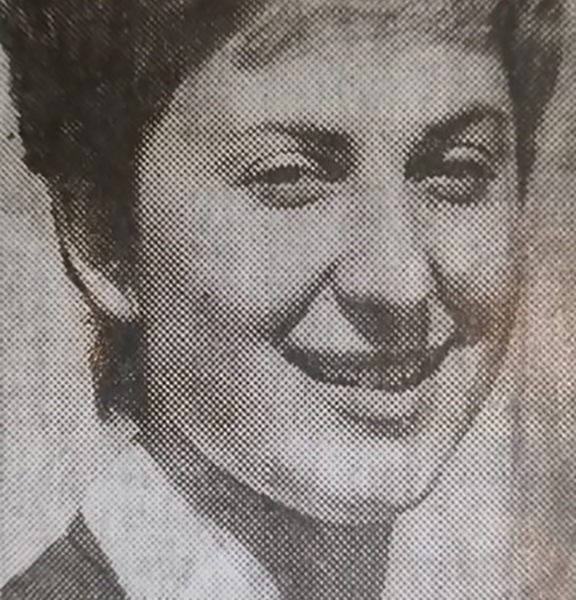Lifestyle/Community
Keeping calm on KLM – the highs and lows of an air hostess in the 60s

It’s not often that you find a nice South African Jewish girl who works as an air hostess, but back in the late-1950s and 1960s, Alicia Slier was the first South African flight attendant to work for KLM Royal Dutch Airlines.
Some of the things she witnessed and experienced 11km in the air make for fascinating tales.
Once, when she and her fellow cabin crew members were preparing for landing, the pilot died of a heart attack. Another time, this Waverley Girls High alumnus helped an elderly lady who refused to disembark the aeroplane.
While flying across the Atlantic Ocean from Curaçao, a “hell of a noise” erupted in the aircraft, with people calling for a doctor or something. “I came rushing and the next thing, a person had a baby in his arms,” says Slier. “The woman next to him had given birth. In Dutch – Papiamentu is the language they speak in Curaçao and is very similar to Dutch – all she apparently said was, ‘The baby is coming.’
“There wasn’t a doctor on board, so we couldn’t cut the cord. We knew what to do if it came to a baby. We would radio and get a doctor, but there wasn’t supposed to be a baby born. As the baby was born in mid-air, we don’t even know today what citizenship it holds.”
When the aeroplane landed in Amsterdam, the doctors came running up to the woman and cut the cord. “The baby wasn’t even crying,” recalls Slier. “The woman got up from the seat, walked to the exit, and turned around and said to the crew, ‘Dank u wel.’ [Thank you very much.]”
After matriculating in 1956, Slier started studying at the University of the Witwatersrand (Wits). “I did a BA (Bachelor of Arts) Languages – Afrikaans, French and Italian,” she says. “I had studied French at school. I thought I would teach, maybe, history and Afrikaans. I went for one year to Wits and the next year, I had a gap year.”
She travelled overseas for three months. “In October and November of that year, I was back in South Africa and wasn’t doing anything. By pure fluke, I bumped into a Hungarian guy who worked for KLM. He told me they were looking for a ground hostess, somebody who could speak languages.”
Being proficient in French, Italian, and Afrikaans, Slier went for an interview and was offered a job at the flag carrier of the Netherlands on the condition that she learnt German.
“I got one of these books about how to teach yourself German. I taught myself in a way that if you spoke German to me, I knew what you were talking about.”
Starting when she was 19, she was a ground hostess for three and a half years at KLM. “I was working at the airport. I used to talk to the crews everywhere. By that time, I picked up a lot of Dutch and spoke a decent Dutch, so I sent the papers that I would love to fly as a flight attendant.”
When she got the nod, she was 22 and a half. “My dad thought it was wonderful. My mother was horrified. I presume that like the other South African mothers, she wanted me to get married. That was the furthest thing from my mind.”
At the time, in about 1962, “KLM was very prestigious and one of the top airlines,” says Slier. “I got a flat in Amsterdam. It was glorious and beautiful. I shared it with a colleague.”
After flying for six months in Europe, Slier became an international flight attendant who was generally part of a crew of about seven men and two women. “That was for the following five years and 10 months. I flew up until 1967. I had the best time of my life.”
Around 1970, she had a flight from Amsterdam to Vancouver. “It was full of all old Hollanders who were going to see their families in Canada. They hadn’t seen their children for 20, 25 years.”
In 1948, a few years after the end of World War II, there was a lot of unemployment in Holland. “Families or young people were encouraged to emigrate, and they all went to live in Canada,” says Slier.
When the aeroplane touched down in Vancouver, all the passengers disembarked except for one elderly lady. “She wouldn’t leave her seat,” recounts Slier. “She sat there crying. I went up to her and in Dutch, I said, ‘What is the matter?’ She said, ‘I have been sick the whole flight.’ She had been vomiting in the paper bag. She had brought up all her false teeth and they had been thrown away. She had no teeth in her mouth. She hadn’t seen her son for about 30 years. She said, ‘He can’t see me like this.’”
Slier disembarked the plane, crossed the tarmac, and saw the lady’s son waiting.
He told Slier, “You go back, and you tell my mother that we want to see her. Teeth or no teeth, we still love her.”
If this story is heart-warming, another of Slier’s experiences is heart-wrenching.
“Just before we were about to land in Tokyo, our captain had a heart attack at the controls. We, the crew, had all been on the beach together in Thailand, running away from crabs, and the next day, at the controls, he had a heart attack and died.”
Slier’s three children are Paula, the Middle East bureau chief of RT, the founder and chief executive of Newshound Media International, and the inaugural winner of the Europcar Women in Leadership Award of the Absa Jewish Achiever Awards; Jack Philip, a trader who spends his time in Johannesburg and Shanghai; and Hayley, an air hostess for British Airways.
